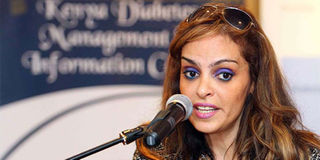First public fertility hospital in East Africa to open next year

Merck Foundation Chief Executive, Dr Rasha Kelej. Dr Kelej has said the new fertility hospital set to be opened in Kampala, Uganda will reduce the cost of fertility treatment from the current Sh 400,000 per session to less than Sh 100,000. PHOTO | SALATON NJAU | NATION MEDIA GROUP
What you need to know:
IVF is the most common and most effective type of assisted reproductive technology to help women become pregnant
Merck Foundation Chief Executive, Dr Rasha Kelej, said she was optimistic that the hospital will reduce the high cost of IVF to less than Sh100,000.
On average, a couple needs three cycles which cost Sh1.2 million or even more, said Dr Kelej.
Women with infertility problems in East Africa will soon benefit from the first ever public hospital to offer in vitro fertilisation (IVF) services in the region.
The fertility centre, currently under construction in Kampala, Uganda, after a deal with Merck Foundation, will be opened to the public in March 2018.
The centre will improve access to safe and regulated fertility care in Sub-Saharan countries including Uganda, Kenya, Rwanda, Tanzania, Zambia, Sierra Leone, Liberia, Gambia, Ghana, Ethiopia and Cote d’Ivoire.
According to a recently released report by World Population Data prepared by US-based Population Reference Bureau, Kenya’s fertility rate stands at 3.9 which is below Africa’s average of 4.6 or about five children for every woman but still higher than the global average of 2.5.
In East Africa, Burundi tops the list with a fertility rate of 5.5, or nearly six children for every woman, followed by Uganda (5.4), Tanzania (5.2), Ethiopia (4.6), Rwanda (4.2) and Kenya (3.9).
COST
IVF is the most common and most effective type of assisted reproductive technology to help women become pregnant. The method of treatment in which the man’s sperm and the woman’s eggs are combined outside the body, in a laboratory dish, and then implanted in a woman’s uterus.
Merck Foundation Chief Executive, Dr Rasha Kelej, said she was optimistic that the hospital will reduce the high cost of IVF to less than Sh100,000.
For couples seeking IVF, one of the biggest obstacles is the cost, which is not covered by insurance companies.
“In East Africa there is no single public hospital offering IVF, while the cost of services in private hospitals is too high that most patients cannot afford. The establishment of the IVF centre in Kampala will drastically reduce the cost and make it affordable,” said Dr Rasha.
A session of IVF costs an average of Sh350,000. And if the procedure is not successful in the first round, the cost can go up to Sh1 million depending on how many times it is done.
AFFORD TREATMENT
She said only five per cent of the population which suffers infertility can afford treatment and that’s why many couples suffer in silence.
“The test tube baby costs around Sh400,000 yet the probability that pregnancy will occur in one cycle is not guaranteed. On average, a couple needs three cycles which cost Sh1.2 million or even more,” said Dr Kelej.
The programme being implemented under the Merck More than a Mother campaign will also provide long term practical training for African embryologists and IVF specialists to treat couples and work on sub Saharan Africa as stand alone experts and this will contribute significantly to reduce the high cost of IVF.
She said the training will go for 20,000 euros per trainee for three months.
FULFILLING MOMENTS
“One of my most fulfilling moments is seeing these childless women lead happy and independent lives. We are going to raise awareness about infertility prevention and management and break the stigma around infertile women. This is quite a transformation,” she said.
She said raising awareness about male infertility is equally important to change the culture as the infertility affects women and men equally and yet women are the ones who have been solely blamed, discriminated and mistreated in their communities.
According to the World Health Organisation, the incidence of infertility is too high in Africa and developing countries, one in every four couples are infertile.
More than 1,000 infertile women have benefited from Merck More than a Mother support in rural areas.
Dr Paul Mitei, a Kisumu-based gynaecologist and obstetrician, said the centre will be saviour to many couples who are suffering in silence.
“Many women have gone through nasty experiences in the name of looking for a child. This will give them an opportunity to feel like women and mothers,” said Dr Mitei.




